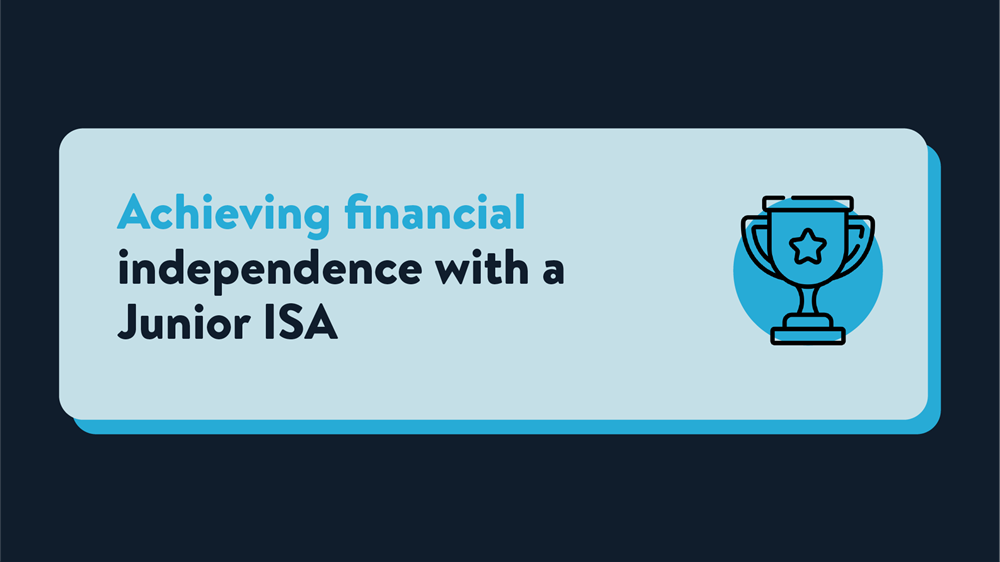Giving your little one a head start in life is likely to be on most parental bucket lists. And, although having them grow up to be confident with money might differ from parent to parent, the good thing is you’re already thinking ahead for their long-term financial independence.
Whether it’s helping them understand the hard work it takes to earn every penny and pound, how to save over a long period, or ‘time spent in the market’ when investing — a Junior ISA could be a straightforward way to tackle this. Here’s a rundown on what a Junior ISA could do for their financial independence:
- Financial benefits of a Junior ISA
- How a Junior ISA contributes to financial independence
- How to get the most out of your Junior ISA
- Conclusion
- Opening a Junior ISA
Financial benefits of a Junior ISA
Junior ISAs offer the same tax-efficiency benefits as their adult ISA counterparts, with the exception of how much money you can deposit per tax year (currently £9,000 in a Junior ISA). You can effectively save (in a Junior Cash ISA) and/or invest (in a Junior Stocks and Shares ISA) on behalf of your child up to that allowance every tax year.
Explain about tax-free growth
Give your child a crash course in taxes – and explain how their money will benefit from tax-free growth over the years in an ISA – as they won’t be subject to capital gains tax or income tax on withdrawal.
Pique their interest with compounding interest
Any profits they build (through interest, dividends, etc.) should feel the benefit of compounding, too. You can use a child’s Junior ISA to tangibly show how money can be compounded to create themselves even more.
Passing down generational wealth
Particularly useful for families whose estates are likely to fall under Inheritance Tax rules (frozen at £325,000 until 2030) [1], they could try taking advantage of the child’s Junior ISA allowance and annual gift allowance over the years, before passing away:
- Every UK resident is entitled to gift £3,000 per tax year completely tax-free — either entirely to one person or spread out to multiple people. And some Junior ISA providers, like Wealthify, offer an option for family members to contribute directly to the account.
- There’s also a seven-year rule for gifting money above this amount without needing to implicate the child for any Inheritance Tax rules. For example, if a grandparent were to contribute the full £9,000 to their grandchild during one tax year, after seven years the amount is completely free from any Inheritance Tax bills. However, if the grandparent passes away before then, there may be a tax bill to deduct from the JISA balance.
Teaching about sustainability with an Ethical Junior ISA
We know that investing in your child’s future goes further than their savings accounts. Many parents want to opt for a brighter environmental future at the same time as building their child’s finances.
If the environment and sustainability are topics your family has around the dinner table, then an Ethical Junior ISA may be a good choice for your child. You could use an Ethical Investment Plan to steer them towards the power of funding companies dedicated to Ethical, Social, and Governance (ESG) investing.
Instil a savings/investing habit from a young age
From regular pocket money to birthday gifts, your child will build money of their own over the years. And, as Junior ISAs come with key benefits:
- The money held belongs to the child (the parent/legal guardian can’t withdraw it).
- The money can’t be withdrawn before they turn 18.
This means there’s up to 18 years' worth of growth on the cards — and you get to steer them towards instilling good habits from an early age.
For example, with Wealthify’s Junior ISA, you could sit down together, sign into the account and monitor their money’s growth. You could also deposit more funds for them, track their investments and, overall, teach them to budget for short-term wants (cash held separately that they want to spend on the latest video game, etc.) and long-term investment goals (their money held in their Junior ISA until 18).
How a Junior ISA contributes to financial independence
Whether you received a lump sum at 18 – or thinking back, you recognise you’d have greatly benefitted from receiving one – building up your child’s financial independence should help them feel more confident and assured than the average person entering adulthood. Being confident with money management is just one key benefit to educating them with a Junior ISA. Others include:
Helping to fund their career or further education goals
Without the potential stress of money for rent, bills, and outgoings, they can be free to pursue graduate, post-graduate, or voluntary work to further build their employability.
Using it as a step onto the property ladder
This is a big first step for many young adults, one that the average person might find themselves still struggling to achieve by their thirties. Since 1997, the average house price in England has increased by 173% (after adjusting for inflation) [2], so it’s no wonder more young people are priced out of home ownership.
A lump sum in their Junior ISA that’s been building up through the power of compounding could be the much-appreciated step up that they’ll value when the time for home ownership comes.
Providing a safety net
Nothing brings a sense of peace quite like financial security. Many experts suggest an emergency fund should be between three to six months’ worth of essential outgoings (no small sum for the average person).
If the plan would be for their Junior ISA to be used as a future emergency fund, this could also be beneficial to their overall wellbeing. Not just physically or mentally, but by reducing the financial stress that comes into play for those, too.
Learning the value of money
While some might argue that handing a child a lump sum at 18 might be blown on partying, holidays, or perhaps a brand-new car, there’s likely a counterargument for using it as a learning opportunity.
If you choose to talk to them about money management from a young age, their budgeting, approaches to risk, and value of money could be significantly more advanced than their peers (with only 24% of people surveyed recalling receiving a financial education at home [3]).
How you choose to approach this as a family will be down to you, but having an open-door policy for answering their questions may afford them a positive attitude toward the value of money in the long haul.
How to get the most out of your Junior ISA
Which type of Junior ISA is best for my child?
The first port of call is to decide whether it’s a Junior Cash ISA or a Junior Stocks and Shares ISA (or one of each) that’s best for your child.
While there are short-term benefits to saving cash and earning interest, this might not be as beneficial as an ordinary (non-JISA) savings account in the long run, given that the money is locked away until the child turns 18. And although there is regular interest to be earned, this may offer lower returns than investing over a long period as a strategy to beat inflation.
On the other hand, investing does come with risk, as no one can predict how the stock market will perform. Although there is an overall trend of performance moving upwards, it’s not sensible to approach investing as a guarantee — as there are always highs and lows.
Set up family and friends to contribute
Whether it was a big birthday gift, or Grandad’s regular pocket money, we understand many loved ones might like to contribute to the Junior ISA, too.
Wealthify’s Junior ISA lets you invite Contributors to the account with ease and even lets them leave a personalised note to go alongside the deposit.
Gratitude comes in many forms, but when your child has a list of gifted money and messages to look back on and smile about, there’s room for deep appreciation for those who have helped them reach their financial independence at 18.
Not to mention that when your child is too little to truly appreciate things, perhaps they don’t really need another cuddly toy or plastic puzzle that may eventually find its way to the charity shop, as much as a contribution to a long-term investment fund.
(And we won’t get you started on the prospect of a gifted drum set!)
Compare provider’s fees and charges
Junior ISAs can be long-term commitments, depending on how early you open them for the child, so shopping around for the best deal is in their interest. A helpful way to do this is to compare providers’:
- Management fees
- Exit charges (because you may need to transfer the Junior ISA and some providers charge this)
- How interest rate is calculated — i.e. accrued daily, paid monthly, annually, whether it’s variable or fixed, etc.
- How investment fees are calculated (if using a Junior Stocks and Shares ISA)
- Any other fees or charges they make you aware of
Transferring is available to you
While the child can only ever have:
- One Junior Cash ISA;
- One Junior Stocks and Shares ISA;
- Or one of each open at the same time.
It doesn’t mean they are restricted from switching providers via their official transfer process. The child also can’t have a Child Trust Fund open at the same time as a Junior ISA; transferring these over is straightforward, but the CTF account would effectively close behind them.
And lastly, take advantage of their tax-free ISA allowance
We know not everyone will be saving this much for their child each tax year, but they have an allowance of £9,000* each year (which resets every April 6th).
Remember, this money is free from capital gains or income tax, meaning the years of growth come with plenty of tax-efficiency, too!
Just remember that if you have one of each type of JISA (one Junior Cash ISA and one Junior Stocks and Shares ISA), the £9,000 allowance needs to be spread across both accounts.
* Note: this amount could be subject to change in the future.
Conclusion
There you have it — if financial independence is up there with the list of aspirations you want for your child, then a Junior ISA could help.
Whether it’s by sitting down and guiding them through how the account works – or actively giving them an opportunity to learn about investing growth, interest built on savings, taxes and the tax-free benefits of ISAs – your family’s approach to teaching your little one will be your own.
What would undoubtedly help though, is a clear example of wealth and money management for you to be able to guide them. And, here at Wealthify, we think Junior ISAs are a clear winner for this.
Opening a Junior ISA
Although planning when’s best to open a Junior ISA is an individual choice, if you’re ready to open a JISA for your child, check out Wealthify’s Junior Stocks and Shares ISA.
We offer Ethical Investing Plans, an investment style to suit your needs (from Cautious to Adventurous), and an award-winning service — having won Best Junior ISA six years in a row at the Personal Finance Awards!
With a Junior ISA, capital is at risk and your child could get back less than invested.
Your tax treatment will depend on your individual circumstances, and it may be subject to change in the future.
Wealthify does not provide financial advice. Please seek financial advice if you are unsure about investing.
Resources:
[2]: https://lordslibrary.parliament.uk/housing-needs-of-young-people/
[3]: https://lordslibrary.parliament.uk/financial-education-in-schools/



